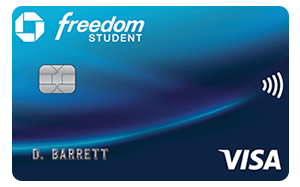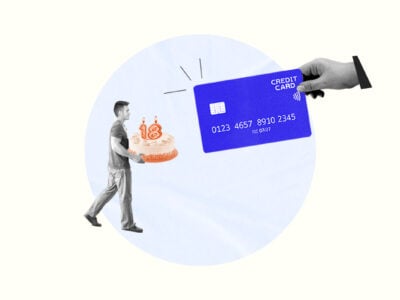Student Credit Cards
| Credit Card | Best For | Credit Score | Annual Fee | Welcome Bonus |
|---|---|---|---|---|
| No Credit | 300–669 | $0 | ||
| Rewards | 580–739 | $0 | Cashback match | |
| Travel | 580–739 | $0 | ||
| Visa | 580–739 | $0 | $50 Bonus | |
| International Students | 580–739 | $0 |
Table of Contents
Being a college student isn’t cheap. Luckily, many credit card companies offer special credit cards to students. These student cards have unique qualification requirements (as new students likely don’t have any credit history) and unique rewards to help fund a student’s lifestyle.
Whether you’re an 18 year old with no credit history or a grad student looking to get serious about your finances, here are the best student credit cards to consider.
Best credit cards for students
Here are the best student credit cards available today, for both American and international students.
Best credit card for students with no credit
Best rewards credit card for students
Discover it® Student Cash Back
|
Annual
Fee
$0 |
Credit
Score
580–739 |
|
Purchase
APR
15.99%–24.99% (variable) |
0% APR
Period
6 Months |
Rewards
-
Welcome Bonus
Cashback match earns you a dollar-for-dollar match on your first-year rewards
-
Rotating Category
5% cash back on select purchases each quarter (e.g., Amazon, grocery stores, restaurants, gas stations, and PayPal), up to the quarterly maximum
-
Everything Else
1% cash back on all other eligible purchases
Why It's Great
The Discover it® Student Cash Back credit card is a great option for students looking for cashback rewards and promotional offers.
Its sign-up benefits include 0% APR on purchases for your first 6 months and a dollar-for-dollar cashback matching program for your first year. After these benefits expire, you can enjoy a $0 annual fee, 5% cash back on food and gas, and a further 1% cash back on all other purchases.
Finally, the Good Grade Reward provides a $20 statement credit for having a 3.0 GPA or higher for up to five years after opening your card.
Pros & Cons
Pros
- No annual fee
- Cashback rewards
Cons
- High interest rate
- Rotating rewards that can be difficult to track
Best travel credit card for students
|
Annual
Fee
$0 |
Credit
Score
580–739 |
|
Purchase
APR
16.99%–26.99% (variable) |
Rewards
-
All Purchases
1.5x points on all eligible purchases
Why It's Great
With no foreign transaction fees and a travel rewards program, the Bank of America® Travel Rewards credit card is perfect for frequent flyers and students who want to study abroad.
The Bank of America® Travel Rewards card allows you to earn unlimited 1.5 points for every $1 you spend. Points can be redeemed as statement credit and used to buy travel perks including flights, hotels, cruises, rental cars, travel add-ons, and vacation packages.
Unlike most travel rewards programs, the Bank of America® Travel Rewards card isn’t tied to specific companies or airlines, so your points can be used anywhere.
Pros & Cons
Pros
- $0 annual fee
- 0% APR intro offer
- Travel rewards
Cons
- Need good credit to qualify
- Cash advance and balance transfer fees
Best Visa credit card for students
|
Annual
Fee
$0 |
Credit
Score
580–739 |
|
Purchase
APR
17.99% (variable) |
Rewards
-
Welcome Bonus
$50 Bonus after you make your first purchase within the first 3 months after account opening
-
All Purchases
1% cash back on all eligible purchases
Why It's Great
Given its high credit score requirements, the Chase Freedom® Student credit card isn’t for everyone. However, it’s a great Visa credit card for students who are able to qualify.
Offering a new member $50 cash bonus, a $20 good standing annual reward, a free credit score lookup service, and a credit limit increase on your Chase card after just 5 months, the Chase Freedom® Student card is perfect for young adults ready to get serious about their finances.
This card is an especially good option for graduate students who want to capitalize on the credit history they’ve built so far and their student status.
Pros & Cons
Pros
- Low regular APR
- $50 new member bonus
- $20 good-standing annual cash bonus
- 1% cash back on all purchases
- Free credit score
Cons
- Need good credit to qualify
- Monthly fees
- 3% foreign transaction fee
- High penalty fees and penalty APR (29.99%)
Best credit card for international students
Deserve® EDU Mastercard®
|
Annual
Fee
$0 |
Credit
Score
580–739 |
|
Purchase
APR
22.49% (variable) |
Rewards
-
All purchases
1% cash back on all eligible purchases
Why It's Great
Deserve® EDU Mastercard® is a low-risk credit card that's especially great for international students. As it’s an unsecured credit card, you won’t be required to pay a security deposit or put down any money up front. Furthermore, you don’t need a Social Security Number to apply, so non-US citizens can qualify for the Deserve® EDU card.
In addition to a 1% cashback reward on all purchases, the Deserve® EDU Mastercard® offers a one-year free subscription to Amazon Prime, cell phone protection, and a $30 referral bonus.
Pros & Cons
Pros
- No Social Security number required
- No deposit required
- No international transaction fees
- Cell phone protection (up to $600)
Cons
- Bad credit holders may not qualify
- $1 minimum interest charge
- No cash advances allowed
How old do you have to be to get a student credit card?
You can get a credit card when you’re 18 years or older. However, borrowers under 21 years old may have a tough time getting a credit card, as anyone between 18–21 needs to show proof of income.
If you’re under 21 and unable to provide proof that you can pay your monthly bills, you’ll likely need a cosigner for your credit card. A cosigner takes responsibility for your credit card bills in the event you’re unable to pay.
Is it easy to get a student credit card?
Yes, it’s generally easy to get a student credit card. Unlike traditional credit cards, student credit cards are designed as first credit cards for people with no credit or previous borrowing history, and they’re good credit cards for 18 year olds.
However, some students may find it difficult to prove a source of income, and you may need to apply for a student credit card with the help of a cosigner.
Do I need a job to get a student credit card?
You don’t need a job to get a student credit card, but you do need proof of income so the issuer knows you can pay your monthly credit card bills. Proof of income varies based on whether you’re under or over 21 years old. If you’re under 21, proof of income must be:
- Personal income from a job
- Scholarship or grant funds leftover after paying tuition and other education expenses
- Your cosigner’s income
If you’re 21 years or older, proof of income can come in the form of:
- Personal income from a job or side hustle
- Loan money
- Scholarships and grants
- Allowance from your parent, guardian, or other individual
- Your spouse or domestic partner’s income
- Your cosigner’s income
Can international students get student credit cards?
Yes, international students can get student credit cards. Some credit cards, like the Deserve® EDU Mastercard®, are available to students without Social Security numbers.
Should I get a student credit card?
Yes, you should get a student credit card. Responsibly using a credit card is a great way to build a credit history, which could help you:
- Qualify for student loans
- Rent an apartment
- Open future lines of credit
Additionally, using a credit card can help offset the many costs of college. In addition to tuition and housing, new student costs include:
- Textbooks and school supplies
- Housing essentials
- Travel back home
Not only do credit cards help with your immediate expenses, but student credit cards offer rewards and bonuses that help fund your college life and studies. A good credit card can even help you save money while traveling after graduation, meaning that the benefits can extend beyond your life in college.
How we rate our student credit cards
Finding the right credit card to get you through college can be tough, especially for new adults with no credit history. That's why we heavily weighted the following factors when determining the best credit cards for students:
- Credit score required
- Annual, maintenance, and foreign transaction fees
- APR
- Deposit requirements
- Rewards and bonuses
These factors, among many others, are part of our 5-star credit card rating methodology for all card categories. Our star ratings are unbiased and independent of our affiliates and advertisers.












